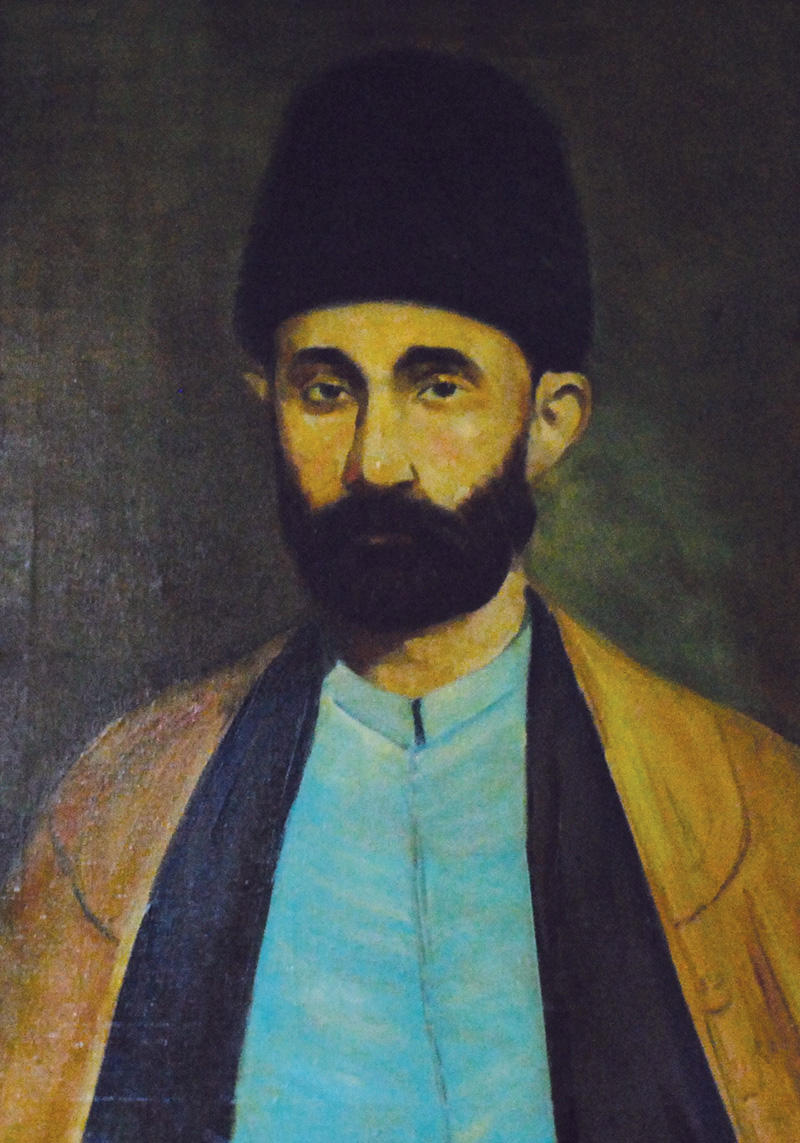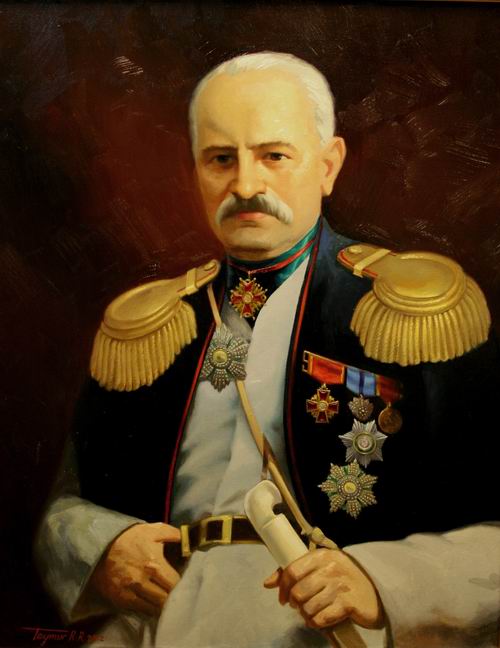
At the beginning of the XIX century, an important event happened in the history of Azerbaijani people - the admission of Azerbaijan into the Russian Empire, - which strengthened western tendencies both in culture and literature. Under this influence national and realistic-world motives in literature rush to the first plan. Under the immediate influence of Molla Panah Vagif's creativity, in Garabagh literary environment appears a representative of critical-realistic satire Gazim bek Zakir(1784-1857), and for along-term period defines the direction of poetic development. Both in the creativity of Zakir and his contemporaries, the traditions of Ruzuli are worked in a new level. The best representatives of this tradition were Seid Aculgasim Nabati (1812-1873) in Southern Azerbaijan, Seyid Azim Shirvani (1835-1888) and Hurshud Banu Natavan (1830-1897) in Nothern Azerbaijan. Seyid Azim dedicated the whole of his life to pedagogical activity, is famous in Azerbaijan literature also as a great enlightener, and the theme of many of his works is about the instruction and education of a younger generation. His satires in the spirit of that of Gasim bey Zakir's is characterized by exposing many of social faults and negative patterns of the men of his time.
As many cultural people of the world, the XIX century period of Azerbaijan literature is characterized as the time of quick progress, the insistent movement to humanist ideals and enlightenment, the time of first serious step towards grounding of power of the brain. Especially after joining of Northern part of Azerbaijan to Russia, in spite of reactionary and colonial charter of the event, one can notice some literary-cultural progress in comparison with the Southern part of the country. It is enough to mention, that the creativity of south Azerbaijan poet Seyid Abulgasim Nabati (1812-1873), the contemporary of Mirza Fatali Akhundzadeh, with its aesthetic beauty, covered only the ideas of Sufism and the thousand-year tradition of the East.
In the surrounding of the men of art and ideas of the period, such as Abbasgulu aga Bakikhanov (1794-1847), Mirza Shafi Vaseh (1792-1852), Ismail bey Gutgashinli (1801-1861), closely acquainted with Russian and western orientalists and poets, and their progressive humanist ideas, you may see the personality of Mirza Fatali Akhundzadeh, who presents Azerbaijan literature to modern world literature and relates it with Russian and the West.
A. Bakikhanov is a great social figure, who managed to synthesize western ideas with the traditional art of the East in Azerbaijan literature, a scientist and a poet. His literary and scientific works, dedicated to Azerbaijan reality had been translated into Russian and Germanic in his life and was also praised in the press of Europe. Fredric Bodenshtedt, the German orientalist, took his master Mirza Shafi Vazeh's poems to Europe, translated it into Germany and published them. 'Nagmeler' ('Songs') of Mirza Shafi, translated into any European language, brought popularity to F. Bodenshtedt and he rejected the authorship of Mirza Shafi… 'Rashid bek and Saadat Khanum', the first successful new Azerbaijan realistic prose by I. Gutgashinli, was published in Warsaw in French.
 Realistic-enlightener view of Mirza Fatali Akhundzadeh (1812-1878) plays a particular role in the further development of Azerbaijan literature and created a stable basis for developing the genres of modern western literature such as drama, novel, tale, short story, narrative, an epic poem and so on in Azerbaijan literature. His first six dramas created in 1850-1855 formed a literary school in the literature of the Near and the Middle East after him. Deep ethic beginning, the motives of humanism, love of justice, sincerity and honesty, generally characterized Azerbaijan literature is again worked over and developed in Akhundzadeh's creativity and is suggested to the future generation. Continuing the advanced traditions of Azerbaijan literature, Mirza Fatali Akhundzadeh was not only a writer, a poet, but also a philosopher, a social figure, who saw the purpose of his creativity in supporting the happiness of his people. Giving great importance to the art and the literature in the enlightenment and achieving modern literary-cultural, scientific values by his people, Mirza Fatali Akhundzadeh was the first creator of works in drama in the East. His six comedies gathered under the name 'Namsilat' ("Hekayeti-Molla Ibrahimkhalil kimyager", "Hekayeti-Misyo Jordan hekimi-nebatat and Dervish Mestelishah jadukuni-meshur", "Hekayeti-khirs guldurbasan", Serguzeshti-veziri-khani-Lenkeran", "Serguzeshti-merdi-khesis (Haji Gara)", "Murafie vekillerinin hekayeti") was published in Tiflis (today's Tbilisy) in 1859. M.F.Akhundzadeh, was not the apologist of Russian tsarism, as some investigators use to think, with the language of aesop, with hints he criticized the policy of colonialism of Russian empire when necessary. His prosaic works as "Kemaluddovla mektublari" (1865), "Aldanmish kevakib" (1857) revealed the faults of the society and political structure of his country as well as Iran's past and state structure.
Realistic-enlightener view of Mirza Fatali Akhundzadeh (1812-1878) plays a particular role in the further development of Azerbaijan literature and created a stable basis for developing the genres of modern western literature such as drama, novel, tale, short story, narrative, an epic poem and so on in Azerbaijan literature. His first six dramas created in 1850-1855 formed a literary school in the literature of the Near and the Middle East after him. Deep ethic beginning, the motives of humanism, love of justice, sincerity and honesty, generally characterized Azerbaijan literature is again worked over and developed in Akhundzadeh's creativity and is suggested to the future generation. Continuing the advanced traditions of Azerbaijan literature, Mirza Fatali Akhundzadeh was not only a writer, a poet, but also a philosopher, a social figure, who saw the purpose of his creativity in supporting the happiness of his people. Giving great importance to the art and the literature in the enlightenment and achieving modern literary-cultural, scientific values by his people, Mirza Fatali Akhundzadeh was the first creator of works in drama in the East. His six comedies gathered under the name 'Namsilat' ("Hekayeti-Molla Ibrahimkhalil kimyager", "Hekayeti-Misyo Jordan hekimi-nebatat and Dervish Mestelishah jadukuni-meshur", "Hekayeti-khirs guldurbasan", Serguzeshti-veziri-khani-Lenkeran", "Serguzeshti-merdi-khesis (Haji Gara)", "Murafie vekillerinin hekayeti") was published in Tiflis (today's Tbilisy) in 1859. M.F.Akhundzadeh, was not the apologist of Russian tsarism, as some investigators use to think, with the language of aesop, with hints he criticized the policy of colonialism of Russian empire when necessary. His prosaic works as "Kemaluddovla mektublari" (1865), "Aldanmish kevakib" (1857) revealed the faults of the society and political structure of his country as well as Iran's past and state structure.
The literary-aesthetic direction chosen by Mirza Fatali Akhundzadeh for his people culture, bred in the second half of the XIX century such realists-enlighteners as S.E.Shirvani (1835-1888), N.Vezirov (1854-1926), A.Hagverdiyev (1870-1933) and served to progress literature and culture not of only Azerbaijan, but also of neighbouring people. The special role in active development of literary-cultural life belongs to the multisided newspaper 'Ekinchi' (1875-1877) printed by naturalist-scientist H.Zardabi (1837-1907). Many literary-social discussions and debates found here their reflection, helped to strengthen and development of humanistic traditions of Azerbaijan literature.
Religious-didactic poetry eloped together with the tendency towards realism-enlightenment in the XIX century Azerbaijan literature. The main representatives of this tendency are south Azerbaijan poets Raji, Dilsuz, dexil, Gumri and others, who wrote mersiye. Under the influence of advanced literary process in northern Azerbaijan, the artists of southern Azerbaijan tried to create world products. "Salabiyye" ("The letter about the fox"), by Muhammed Bagir Halhali(1829-1900), "Kitab yuklu eshek" (1888) ('Donkey with books'), by Abdurrehim Talibov, "Ibrahim beyin seyahatnamesi" ('The trip of Ibrahim bey'), by Zeynalabdin Maragayi (1892) are the corresponding samples of realistic-world literature.
Another branch of the XIX century literature, inclined to the East creation was formed in literary meetings. The literary meeting "Gulustan" in Guba was ruled by Abbasgulu aga Bakikhanov Gudsi, "Acumeni-shuara" ("the assembly of poets") in Ordubad by Haji aga Fagir Ordubadi, "Fovcul-fusaha" ("the group of orators") in Lenkoran by Mirza Ismail Gasir, "Beytus-Sefa" ("The house of Sefa") in Shamakhi by Seyid Azim Shirvani, "Mejmeush-shuara" ("the group of poets") in Baki by Muhammed aga Jumri, "Divani-hikmet" in Genja (later in Tiflis) by Mirza Shafi Vazeh, poetic meeting "Meclisi-uns" in Shusha by Khurahud Banu Natevan, "Mejlisi-feramushan" ("the meeting of lost") by Mirza Mohsun Navvab. There was a close relation between poetic meetings and the poets correspondent to each other. The XIX century literature created a foundation for XX century literature, a new higher level of Azerbaijan literature.
Alike many other people included once into the Russian empire, the first decades of XX century Azerbaijan literature make a special level in literary-cultural life of Azerbaijan. With their own creativity well-known representatives of realistic and romantic literature, based on the pattern of Europe and Russia, such as J.Mammedguluzadeh (1866-1932), M.A.Sabir (1862-1911), H.Javid (1884-1944), M.Hadi (1880-1920), A.Sahhat (1874-1918), A.Shaig (1881-1959), raised the level of Azerbaijan literature to one of the best patterns of literary-cultural conception of the world. J.Mammedguluzadeh and M.A.Sabir, the representatives of realistic literature, M.Hadi, A.Shaiq, that of romantic poetry, H.Javid that of dramaturgy, played a greater role in the development of the literary-social idea of Azerbaijan.  Under the editorship of the great artist and a social figure, J.Mammedguluzadeh people get acquainted with periodical 'Molla Nasreddin', firstly published in 1906 in Tiflis, for 25 year-long periods of time played an important role in literary-cultural and social-political life and parallel to it in its realistic-humoristic style "Fuyuzat", 32 times published under the editorship of famous publicist, philosopher and social figure A.Huseynzadeh (1864-1940), which with their serious and romantic style served to enlighten and develop our people.
Under the editorship of the great artist and a social figure, J.Mammedguluzadeh people get acquainted with periodical 'Molla Nasreddin', firstly published in 1906 in Tiflis, for 25 year-long periods of time played an important role in literary-cultural and social-political life and parallel to it in its realistic-humoristic style "Fuyuzat", 32 times published under the editorship of famous publicist, philosopher and social figure A.Huseynzadeh (1864-1940), which with their serious and romantic style served to enlighten and develop our people.
Among literary figures of the time Jalil Mammedguluzadeh (1866-1932), the author of "Hophopname" Mirza Alekber Sabir (1862-1911) had a greater role in ideal-aesthetic development of Azerbaijan literature. Their realist and satiric works criticizing lack of culture, fanaticism, prejudice and ignorance had remained their importance and actuality up today.
Enlightening dramaturgy, developed with the traditions of M.F.Akhundzadeh, became richer with comedies and the tragedy by Najaf bey Vezirov(1854-1926) 'Musibeti-Fakhreddin'(1894), written at the complete of XIX century, comedies and such tragedies of Abdurrahimbey Hagverdiyev(1870-1933) as "Dagilan tifag", "Bekhtsiz javan" (1900), "Aga Muhammed shah Gajar" (1907), "Shamdan bey", "Nadanlig", "Nadir shah" by Nariman Narimanov (1870-1925), "Oluler" (1909), "Anamin kitabi" (1920) by Jalil Mammedquluzadeh.
Works in the romantic-historical topic of dramaturgy are created by Huseyn Javid (1882-1944) in 1910-1918, such as "Ana", "Maral", "Sheykh Sanan", "Sheyda", "Uchurum", "Iblis".
A Great event happened at the beginning of the XX century in the history of Azerbaijan was the creation of the Azerbaijan Democratic Republic (1918-1920). Its 23-month year-long life is significant with the creation of particular literature of that time. Together with the well-known pen-masters J.Mammedguluzadeh, A.Shaig, A.Hagverdiyev, U.Hajibeyov appeared interesting works of such young artists as J.Jabbarl?, A.Javad, Ummigulsum. Those works praised the liberty of Azerbaijan, the victory of the Turkish army in our country with rescue-mission, the heroism of Azerbaijan soldiers, national three coloured flags. Ahmad Javad(1892-1937), showing particular activity that time, wrote the words to the national anthem of first Republic. That work, the composer of which was genius U. Hajibeyov is now the anthem of Azerbaijan Republic.



